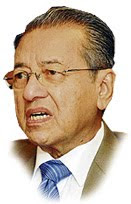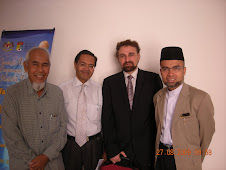Published: Saturday March 28, 2009 MYT 12:28:00 PM
Updated: Saturday March 28, 2009 MYT 12:49:30 PM
China challenges US global financial leadership
SHANGHAI: The only major economy still growing at a fast clip, China is being unusually forthright in challenging the U.S.-led global order ahead of an April 2 summit on the financial crisis.
In his second rebuke of U.S. leadership this past week, the central bank governor, Zhou Xiaochuan, said China's rapid response to the downturn - including a 4 trillion yuan ($586 billion) stimulus package - proved the superiority of its authoritarian, one-party political system.
"Facts speak volumes, and demonstrate that compared with other major economies, the Chinese government has taken prompt, decisive and effective policy measures, demonstrating its superior system advantage when it comes to making vital policy decisions," Zhou said in remarks posted on the People's Bank of China's Web site.
In the approach to the London summit of 20 leading economies, Zhou called on foreign governments to give their finance ministers and central bankers broad authority so that they can "act boldly and expeditiously without having to go through a lengthy or even painful approval process."
China has made its agenda clear: It wants a stable U.S. dollar, and has even advocated the creation of another global currency altogether.
It is leery of protectionism.
And it is demanding a larger say in how financial systems are regulated and rescued, while holding back on any promises for new rescue or stimulus measures of its own.
"So far, China has been playing a game set up by other powers. Now China wants to be part of the agenda or rules-setting," said Ding Xueliang, a China expert at Hong Kong's University of Science and Technology.
Whether Beijing has a workable alternative vision for the future of world finance remains to be seen.
But China's growing assertiveness also suggests a sharpening urgency over its vulnerability to the global financial meltdown.
Fearful of any moves that might weaken the dollar and imperil China's estimated $1 trillion in Treasuries and other U.S. government debt, Chinese Premier Wen Jiabao has urged the United States to remain "a credible nation."
In other words, Beijing wants Washington to avoid spurring inflation with excessive government spending on bailouts and stimulus packages.
To keep the value of its own currency steady - some say undervalued - the Chinese government must recycle its huge trade surpluses.
The biggest, most liquid option is U.S. Treasuries.
But a weakening dollar saps the value of those investments.
The Chinese "are being hurt more than anyone else by the mismanagement of the dollar," said William Overholt, an expert with Harvard University's Kennedy School of Government.
Underscoring that grievance, earlier this week Zhou, the central bank governor, called for a new global currency to end the dollar's dominance in trade, foreign reserves and commodity pricing.
Echoing proposals that have been debated for years, he urged the International Monetary Fund to create a "reserve currency" based on shares in the organization held by its 185 member nations, known as special drawing rights, or SDRs.
Such a move would "achieve the objective of safeguarding global economic and financial stability," Zhou said in an essay released by the central bank both in English and Chinese.
Given the wariness of most governments toward relinquishing any sovereign control over their currencies, few even in China view Zhou's proposal as likely to catch on anytime soon.
"Nobody believes the current global monetary system will be changed soon.
It's more like a warning or signal to America to let them know how important it is to keep the dollar stable," said Ding Xinghao, president of the Shanghai Association of American Studies, a private academic think-tank.
China's stolid and somber president, Hu Jintao, will likely focus on cooperation rather than table pounding when he meets President Barack Obama for the first time at next week's London summit on the financial crisis.
"There is no strong consensus between the U.S. and Europe. They have different policy priorities. The EU is quite weak. There are too many states with different opinions and different policy priorities," said Zheng Yongnian, director of the East Asia Institute at the National University of Singapore.
"So it would be easier for the U.S. and China to work together, despite their huge differences."
Still, China is committed to leading a push by the developing world for a greater say in how global finance is regulated and managed.
G-20 members already have agreed that developing countries need a bigger voice in the IMF.
But under a system devised 63 years ago, each country's vote is tied to its financial commitments to the institution, which are determined by economic size, currency reserves and openness to trade and capital flows.
Wang Qishan, a top Chinese financial official and vice premier, said Friday in a commentary in The Times of London that Beijing was ready to contribute more, but wants changes in the IMF's governance structure.
"China is ready to play an active part in exploring ways to raise resources and will contribute to this effort within its ability," Wang wrote.
But he reiterated China's rejection of calls for it to provide part of its $2 trillion in foreign reserves to an IMF bailout fund.
China's leaders have problems at home that they need to spend on, and they insist that their country's greatest contribution to a global recovery is keeping its own house in order and following through on its stimulus package.
Wen said fresh stimulus measures were possible, but only if necessary.
"They've barely spent half of the money.
Why should they be spending more now?" said Jing Ulrich, chairwoman for China equities at J.P. Morgan. "They are pacing themselves."
Despite its massive foreign reserves and an economy that many analysts believe is on the brink of recovery, China's leaders face stunning challenges in finding ways to create jobs for millions of migrant workers left newly unemployed.
Social welfare and health systems are inadequate and its environment wrecked by decades of rampant industrialization.
"On the top, national level, yes, China has lots of money," says Ding Xueliang, a former Communist Party official.
"But if you look at the troubles, all the economic and social challenges the leadership faces, China may hold so much money but it's not enough. It's not enough," he said.
Still, he says, China's leaders do recognize the need to make a bigger contribution if they want a larger say in reshaping the world financial order.
"More and more of the leadership see there is an opportunity for China," Ding said.
"I don't expect a big contribution is possible in the short-term, but a gradual increase in support is possible."
For Another perspective from the China Daily, a partner of Asia News Network, click here
Latest business news from AP-Wire
Most Viewed
Most E-mailed
Baby gloom haunts Lee
Father of four sues bank for causing him to be declared a bankrupt
Canny Ong’s killer to hang, Ahmad Najib loses final appeal
Khir: Selangor dropping contractors with links to BN
Court no place for Bollywood drama
Police shoot dead three armed men, arrest three others near resort
Motion on Khir to be tabled at State Assembly
First Lady pitching for home-grown veggies
Missing doctors found dead in ravine
Proper rest and meals
Baby gloom haunts Lee
TB cases on the rise again
Missing doctors found dead in ravine
First Lady pitching for home-grown veggies
Canny Ong’s killer to hang, Ahmad Najib loses final appeal
Khir: Selangor dropping contractors with links to BN
Frozen — pay of both MBs
New rating system for driving schools next year: JPJ
Perak Pakatan accuses Ipoh council of misusing public funds
Specialist doctors go missing
Latest Jobs from Star-JobsSales Team Lead
Project Managers
.Net Developers - Programmers
Business Development
Health Safety & Environment Manager
Civil Engineering Designer cum Drafter
Draftsman
Home Credit Sales Advisors
Public Relations Consultants
SECRETARY
Subscribe to:
Post Comments (Atom)







































No comments:
Post a Comment